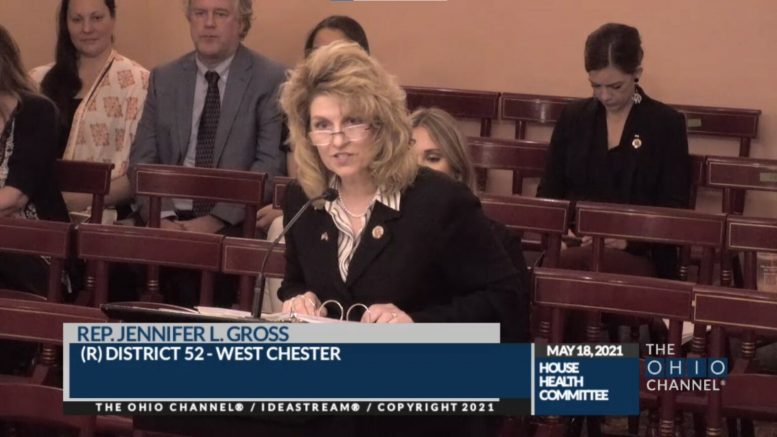Sponsor compares requesting proof of vaccination to Holocaust
With demand for the COVID-19 vaccine in a recent slump, Ohio Republicans launched a pre-emptive strike Tuesday that would preclude a wide range of schools, businesses, and employers from mandating vaccinations.
Rep. Jennifer Gross, R-West Chester, presented House Bill 248, the “Enact Vaccine Choice and Anti-Discrimination Act” to the House Health Committee for its first hearing. It’s one of two bills the committee reviewed Tuesday to weaken institutional vaccine mandates in Ohio.
House Bill 248, backed by anti-vaccination interest groups, prohibits people, public officials, governments, day-care centers, nursing homes, health care providers, insurers, and others from mandating vaccination or requesting people to do so. It would apply to all vaccines, not just COVID-19.
Schools could require vaccinations under the bill but would have to recognize “reasons of conscience” and notify parents of the exemption, along with other carveouts like religious convictions, natural immunity or medical contraindications that already exist in law.
It would also prevent businesses from treating unvaccinated customers or employees differently than vaccinated ones.
Speaking to reporters, Gross described businesses requiring proof of vaccination as “eerily similar” to Nazis forcing Jews to wear yellow badges to identify their faith before systematically slaughtering more than 6 million of them during the Holocaust.
“Those that were lost are a grave, grave reminder that we should not be forcing anyone to take experimentation, as this vaccine is an experimental use authorized vaccine,” Gross said.
COVID-19 vaccines are currently regulated under an emergency use authorization, not experimental use. All three vaccines currently authorized for use underwent large scale, double blind clinical trials before they were made available to the public. CDC data from ongoing safety and efficacy monitoring have shown the products to be safe and powerful tools to slow the spread of COVID-19, which has killed more than 19,600 Ohioans and hospitalized more than 58,000.
Speaking to the House Health Committee, Gross, a nurse, pitched the bill as an “anti-discrimination” measure that shields employees, students, or customers from any “Draconian” vaccine mandate.
“This is not a scientific bill,” she said. “This is a freedom bill.”
Rep. Beth Liston, a Dublin Democrat and practicing physician, needled at two separate bills the committee heard Wednesday, both generally aimed at blocking vaccine mandates. She said they take away the freedoms of institutions to create safe workplaces, schools, etc.
“I think if there are organizations, businesses, schools that believe it’s important that their employees or attendees are vaccinated for the safety of their business and the public, that should be something they’re able to do,” she said in an interview after the hearing.
Several businesses are offering perks like free beer, donuts, or burgers to incentivize vaccination; others are separating vaccinated patrons from the non-vaccinated; some in New York are only admitting vaccinated fans. HB 248 would likely quash all these practices.
Current Ohio law allows employers to require vaccinations among employees. The mandates usually allow exemptions for medical contraindications and, sometimes, refusals on religious grounds.
Most colleges and universities, for now, are not requiring students to take the COVID-19 vaccine before returning to campus in the fall. Cleveland State University and Kenyon College are doing so for students living on campus, though HB 248 imperils this plan.
On a call last year with Health Freedom Ohio, an anti-vaccine advocacy group, House Health Chairman Scott Lipps, R-Franklin, told members he’ll need help to “stop this vaccine shit that’s coming.” On Tuesday, he expressed opposition to hospitals “coercing” employees to take vaccines.
Health care providers oppose
Two industry associations representing hundreds of Ohio nursing homes and long-term care facilities, home to the bulk of pandemic mortality, said they oppose the idea.
The Ohio Health Care Association, which mainly represents private care facilities, said in a statement it has concerns with the bill.
“Not only does it inhibit the ability of our members to operate their businesses and protect their employees and customers, it also is in conflict with federal guidelines that require our members to allow greater freedoms to residents and staff who have been fully vaccinated,” said OHCA’s executive director Pete Van Runkle in an email.
Patrick Schwartz of LeadingAge Ohio, which represents nonprofit long-term care care facilities, shared some of the same concerns as Van Runkle regarding federal guidance for infection control protocols that distinguishes between vaccinated and unvaccinated residents.
He said many health care providers have long required flu shots — requiring a vaccination is hardly new.
“While we are still reviewing the bill, the facts point to the danger of COVID-19 for unvaccinated residents of long-term care facilities,” he said. “Vaccines brought well-deserved freedom and security back to residents.”
Ohio Hospital Association spokesman John Palmer said OHA is still reviewing the bill but “historically we’ve supported efforts to give hospitals flexibility in this space to protect patient and caregiver safety.”
A Chamber of Commerce spokeswoman did not respond to an inquiry.
Holocaust
The Cleveland Browns allowed the public to attend the 2021 draft regardless of COVID-19 immunity but also established a “vaccinated fan zone.”
Gross, speaking to a television reporter, called this “eerily similar” to World War II and said “we need to be very careful” when people are identified as vaccinated or unvaccinated. The reporter asked her to clarify the comment.
“I would argue that I love Israel, and I always support Israel, but that we need to be aware, and those who forget the past are condemned to repeat it, and that we should remember that we lost over 6 million Jewish people,” she said.
“Did they require our Jewish people to wear a star? And MetroHealth is requiring people to wear a sticker on there to show that they’re vaccinated or not vaccinated. What will come next?”
MetroHealth, a hospital network in the Cleveland area, declined comment.
Gross agreed to a separate interview with the Ohio Capital Journal only on the condition a reporter removed his mask. She declined comment when asked what vaccine requirements have to do with the Holocaust.
***
Census data used for Ohio redistricting may arrive just in time
Ohio is now set to receive its U.S. Census data necessary to draw new legislative districts in mid-August, giving the state a short amount of time to abide by a redistricting timeline approved by voters.
Delays in processing census data — due to the pandemic — have made Ohio officials worry the state would not be able to meet its constitutional deadlines to approve the new districts.
The federal government is now agreeing to provide the data to Ohio by Aug. 16. READ MORE
Legislators confident in school funding overhaul staying in state budget
Two state legislators, including the chair of the Senate Primary & Secondary Education Committee, say a newly proposed funding formula is still alive in Ohio’s biennial budget.
State Sen. Andrew Brenner, R-Delaware, assured a recent Central Ohio virtual town hall including local educational representatives that despite the fact that the majority of the funding formula introduced during the last General Assembly died at the end of the year, the biennial budget brings with it the formula that lessens the weight of property taxes, and expands eligibility for private school voucher programs.
“I believe in this budget there will be a school funding formula in it,” Brenner said.
The total bill for the six-year phase-in of the formula will be closer to $2.2 billion, rather than the $1.8 billion price tag the formula founders estimated, Brenner said, but could have the support of Gov. Mike DeWine, needed to get the budget bill signed and put into law.
“Gov. DeWine has indicated he will support something as long as it’s sustainable,” Brenner told the town hall. READ MORE
Biden praises Tlaib, previews Ford F-150 Lightning and touts jobs plan in Dearborn
President Joe Biden praised U.S. Rep. Rashida Tlaib (D-Detroit) for her passion relating to Palestine during a stop in Dearborn on Tuesday.
“I want to say to you that I admire your intellect, I admire your passion and I admire your concern for so many other people,” Biden told Tlaib. “And from my heart, I pray that your grandma and family are well, and I promise I’m going to do everything to see that they are, on the West Bank.”
Tlaib, the only Palestinian-American member of Congress, has been critical of Biden’s stance on Israel and met with the president at the airport, per a White House pool report.
At least three protests were planned to coincide with Biden’s visit to a part of Dearborn that’s estimated to be more than 90% Arab American Muslim, the Detroit Free Press reported.
Biden was in Dearborn to tour the Ford Rouge Electric Vehicle Center, where the company will produce an electric version of their F-150 pickup truck. READ MORE





